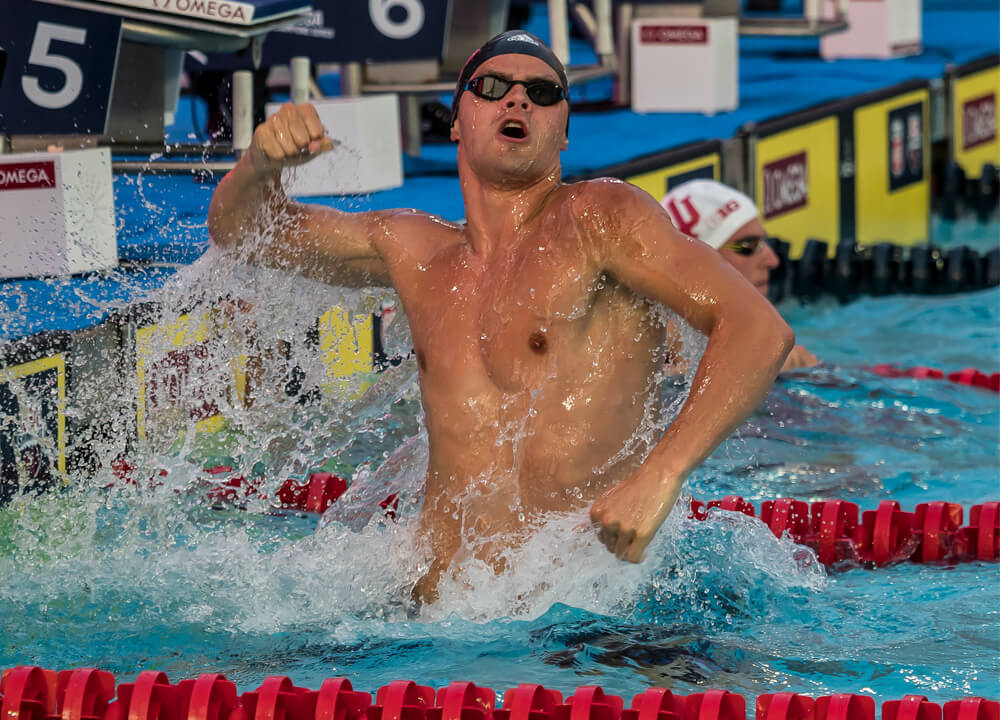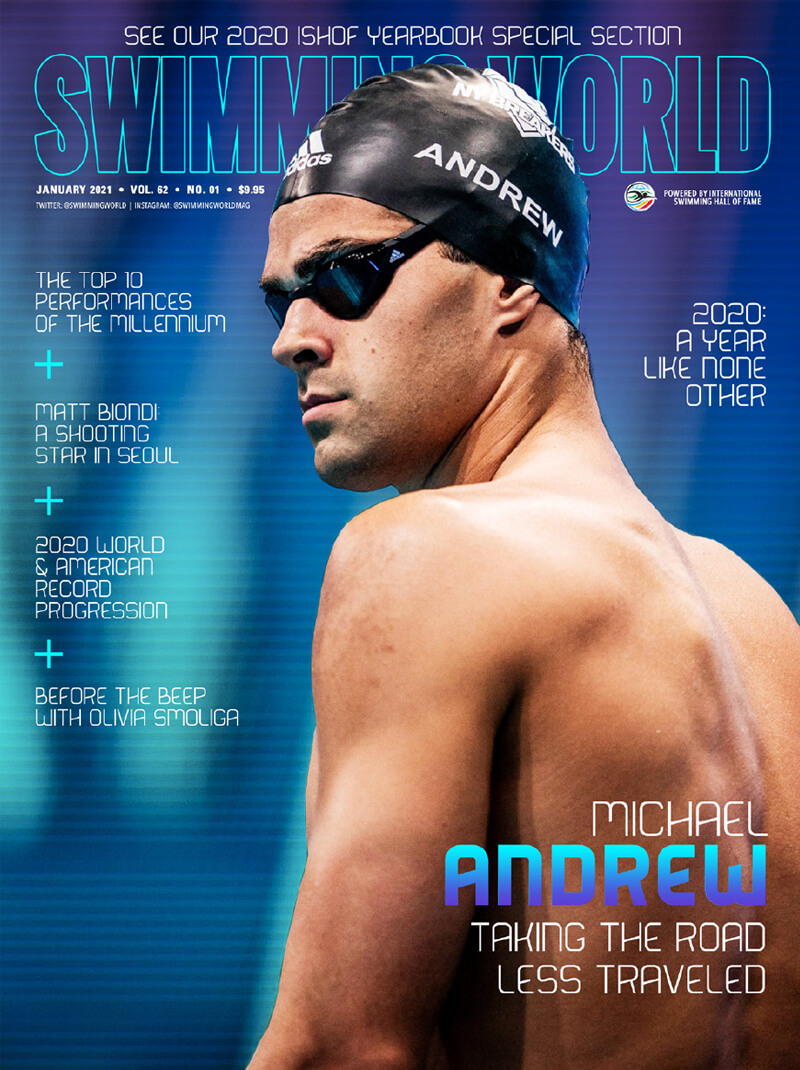Swimming World Presents – Michael Andrew: Taking The Road Less Traveled, To Tokyo 2021

The latest issue of Swimming World Magazine
is now available for download in the Swimming World Vault!
Non-Subscribers Can Download This Issue Here
Michael Andrew: Taking The Road Less Traveled, To Tokyo 2021
By David Rieder
Michael Andrew has been the target of criticism the last seven-and-a-half years for his decision to turn pro at 14, his unique training style (USRPT), his training plan and more. But he’s also enjoyed success along the way and is ready to move to the next level as he prepares to qualify for the 2021 Olympics.
Each time Michael Andrew has achieved success in his swimming career, criticisms and questions have followed. When he first became a professional swimmer at just 14 years old after breaking an endless stream of age group records, traditionalists slammed the move as improper. His training system became a constant matter of debate on pool decks.
Some viewed Andrew as a swimming outcast, while others saw a teenager destined to become the world’s best swimmer.
As Andrew reached his late teens, he became one of the top junior-level swimmers in the United States, but his abilities to match up on the senior level came into doubt. Then, once he started having success on the senior level, the question became: “Could he be anything more than an exceptional talent in 50-meter races?”
Undoubtedly, Andrew has followed a career path much different than any other acclaimed American swimmer. His mother, Tina, is his agent and manager, and his coach is his father, Peter. The father-son duo swears by Ultra-Short Race-Pace Training (USRPT), seen for years in conventional wisdom as the complete antithesis of how every other swimmer trains (a faulty notion, if not entirely incorrect).
So close is the Andrew family that when Michael speaks about his own preparation and his own success, he uses the pronoun “we” instead of “I.” That “we” includes Michael, his parents and his younger sister, Michaela.
“Growing up, I’ve always kind of understood that I wouldn’t be in the position I am today if it weren’t for the team behind me. Really, that team mostly consists of my family, and so when I speak about what I’m doing in the sport or something I’m going to do, a competition I’m preparing for, it’s really us as a unit who are getting ready,” Andrew said. “It’s just very natural for me to refer to us as ‘we’ because I understand that we operate just as a team.”
While most club swimmers seek to build toward the NCAA level, Andrew prioritized breaking national age group records and then venturing out onto the World Cup circuit, where he wracked up wins and prize money. He prioritized a racing format, short course meters, that held little relevance to most of his American compatriots, and he actually won his first short course World title (100 IM in 2016 at Windsor) a full 18 months before qualifying for his first senior international team in long course. Along the way, Andrew accumulated numerous sponsorship deals that made him one of the more profitable swimmers in the country, even while he was a teenager.
And then, when the then-19-year-old Andrew won his first U.S. national title in 2018, much of the swimming community shrugged off the accomplishment since it came in the non-Olympic race 50 fly—even if he did beat out Caeleb Dressel in the process! But Andrew kept winning, with a national title each of four straight nights—and each win brought him further validation and vindication. That included a U.S. Open record in the 50 breast, first place in a deep 100 breast heat (his first title in an Olympic event) and a dominant victory over Dressel in the 50 free.
“I do feel like this is kind of the kickstart of my adult professional career,” Andrew said that week. “It’s the first official long course international team that I’ve made, so I definitely think it gives me a lot of credibility, especially with the way we train being so different: race-pace, all short. It just goes to show that it works, and there’s different ways to do things.”
A few weeks later, Andrew won his first-ever senior-level international gold at the Pan Pacific Championships, and his time of 21.46 bested Dressel by nearly a half-second and ranked Andrew as the sixth-fastest swimmer in the world for 2018.
Questions remained, sure…like “How did Andrew’s event schedule fit together?” But Andrew had finally established himself firmly as an international force in a long course Olympic event.
BE THE BEST IN ALL YOU DO
At 2018 Nationals, Andrew faced the question of what was his best stroke, but he would not commit to just one or two. “I could never put that label on myself,” he said. “I will always swim all strokes. I definitely think there’s seasons where one stroke may be more dominant than the others, but the goal is to be the best in the world in all four strokes in the 50s, and then the 100s can come after that.”
And in 2019, he was absolutely among the best in the world at all four strokes in the 50s. At the FINA World Championships in Gwangju, he became the first swimmer ever to make the final in all four, and his highest finish was fourth, just 1-hundredth out of the medals in the 50 fly. He also finished fifth in the 50 back, sixth in the 50 free, seventh in the 50 breast and a relatively disappointing 19th in the 100 breast. He did earn a silver medal as a prelims medley relay swimmer.
Get Swimming World Magazine and Swimming World Biweekly FREE When You
Become A Member of the International Swimming Hall of Fame
New! 30 Day Membership to ISHOF AND Digital Swimming World Subscription for just $10 a month!
Want more? Get a 1 Year ISHOF Family Membership With Swimming World Print AND Digital Subscription Order Now!
Non-Subscribers can click here to download this issue for only $5.94
Swimming World Magazine January 2021 Issue
FEATURES
011 A YEAR LIKE NONE OTHER
by Dan D’Addona
The top story of 2020—the COVID-19 pandemic—impacted all of the year’s stories in aquatics…from age group, high school, college and Masters competition all the way to the Olympics!
012 THE TOP 10 PERFORMANCES OF THE MILLENNIUM’S FIRST 20 YEARS (2000-19)
by John Lohn
One month after we selected the Swimmers of the Millennium (to this point), we have picked the top 10 performances of the millennium’s first 20 years. The swims that were selected were not just based on speed, but carried a certain level of significance or marked a defining moment in the sport.
020 TAKING THE ROAD LESS TRAVELED
by David Rieder
Michael Andrew has been the target of criticism the last seven-and-a-half years for his decision to turn pro at 14, his unique training style (USRPT), his training plan and more. But he’s also enjoyed success along the way and is ready to move to the next level as he prepares to qualify for the 2021 Olympics.
024 WHO “SHOT” THE SWIMMERS?
by Bruce Wigo
This is the first part of a series that highlights an International Swimming Hall of Fame exhibit showing the history of swimming through the eyes of the photojournalists who have covered the aquatic sports for more than 150 years.
028 A SHOOTING STAR IN SEOUL
by John Lohn
American Matt Biondi had it all. The physique. The pure talent. The inner drive. Add those traits together, and it is no surprise that Matt Biondi—over the span of three Olympiads—cultivated one of the finest careers the sport has ever seen.
031 2020 WORLD & AMERICAN RECORD PROGRESSION
compiled by Andy Ross
033 NUTRITION: IF YOU WANT TO BE AN OLYMPIAN OR WORLD CHAMPION, THEN TRAIN LIKE ONE!
by Dawn Weatherwax
A strong immune system means fewer days out of the water.
038 MENTAL PREP: BEFORE THE BEEP WITH OLIVIA SMOLIGA
by Shoshanna Rutemiller
COACHING
015 SELLING PROCESS TO SWIMMERS (Part 1)
by Michael J. Stott
In 1993, Swedish cognitive psychologist Anders Ericsson wrote that greatness wasn’t born, but grown. His ideas later formed the basis for the “10,000-hour rule” described in Malcolm Gladwell’s book, “Outliers” (2008), which holds that it takes roughly 10,000 hours of practice to achieve mastery in a skill or field. Known by the term, “process,” to coaches, Swimming World details how they use that learning curve to improve the performance of their swimmers.
036 SWIMMING TECHNIQUE CONCEPTS: FREESTYLE TECHNIQUE FOR SPRINT AND DISTANCE (Part 1)
by Rod Havriluk
Many sources suggest that swimmers use a different freestyle technique for sprint and distance events. However, science (both physics and research) shows us that a swimmer can optimize performance in events of all distances by using the same arm motion with a different arm coordination.
040 SPECIAL SETS: TOUGH SETS THE DON SWARTZ WAY
by Michael J. Stott
Don Swartz, now at North Bay Aquatics, was Rick DeMont’s coach at Marin Aquatic Club in the early 1970s when he set world records in the 400 and 1500 meter freestyle. The halcyon era was a time of mega yardage being done by the likes of DeMont and fellow Olympians Brian Goodell, Bobby Hackett and Australia’s Steven Holland. When it came to designing tough sets, you could say that Swartz had a front row seat.
043 Q&A WITH COACH KATIE ROBINSON
by Michael J. Stott
044 HOW THEY TRAIN MIRIAM GUEVARA
by Michael J. Stott
TRAINING
035 DRYSIDE TRAINING: RESOLUTIONS FOR SWIMMING FASTER IN 2021!
by J.R. Rosania
JUNIOR SWIMMER
047 UP & COMERS: LEVENIA SIM
by Shoshanna Rutemiller
COLUMNS
008 A VOICE FOR THE SPORT
027 DID YOU KNOW: ABOUT SPORTS CARTOONS?
042 THE OFFICIAL WORD
046 GUTTERTALK
048 PARTING SHOT
Swimming World is now partnered with the International Swimming Hall of Fame. To find out more, visit us at ishof.org




